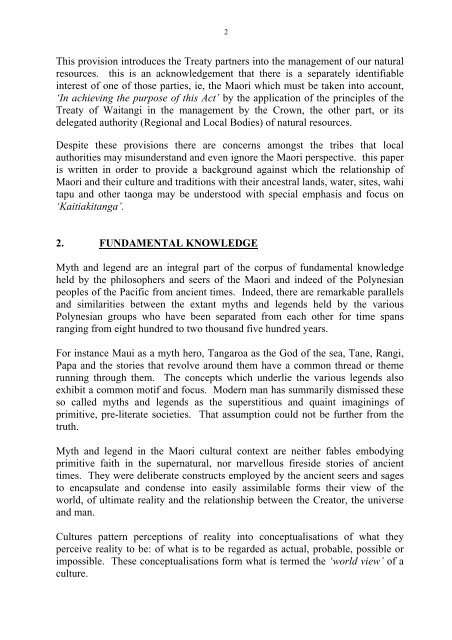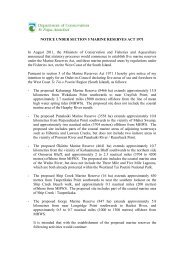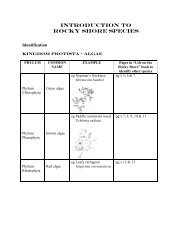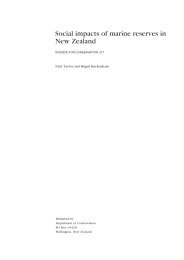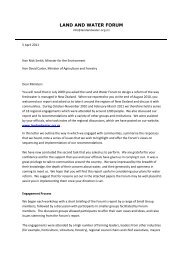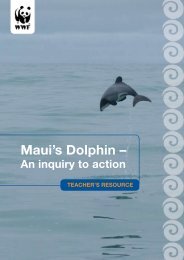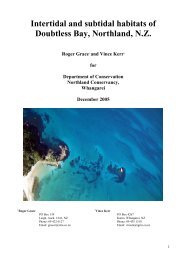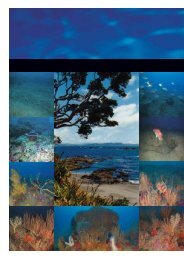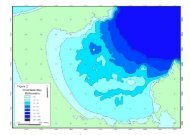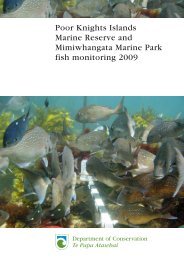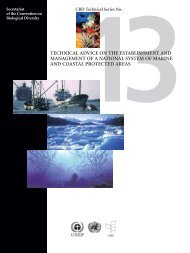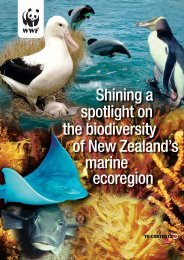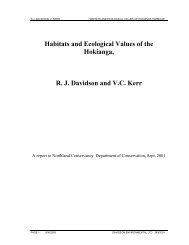KAITIAKITANGA A Definitive Introduction to the ... - MarineNZ.org.nz
KAITIAKITANGA A Definitive Introduction to the ... - MarineNZ.org.nz
KAITIAKITANGA A Definitive Introduction to the ... - MarineNZ.org.nz
You also want an ePaper? Increase the reach of your titles
YUMPU automatically turns print PDFs into web optimized ePapers that Google loves.
2<br />
This provision introduces <strong>the</strong> Treaty partners in<strong>to</strong> <strong>the</strong> management of our natural<br />
resources. this is an acknowledgement that <strong>the</strong>re is a separately identifiable<br />
interest of one of those parties, ie, <strong>the</strong> Maori which must be taken in<strong>to</strong> account,<br />
‘In achieving <strong>the</strong> purpose of this Act’ by <strong>the</strong> application of <strong>the</strong> principles of <strong>the</strong><br />
Treaty of Waitangi in <strong>the</strong> management by <strong>the</strong> Crown, <strong>the</strong> o<strong>the</strong>r part, or its<br />
delegated authority (Regional and Local Bodies) of natural resources.<br />
Despite <strong>the</strong>se provisions <strong>the</strong>re are concerns amongst <strong>the</strong> tribes that local<br />
authorities may misunderstand and even ignore <strong>the</strong> Maori perspective. this paper<br />
is written in order <strong>to</strong> provide a background against which <strong>the</strong> relationship of<br />
Maori and <strong>the</strong>ir culture and traditions with <strong>the</strong>ir ancestral lands, water, sites, wahi<br />
tapu and o<strong>the</strong>r taonga may be unders<strong>to</strong>od with special emphasis and focus on<br />
‘Kaitiakitanga’.<br />
2. FUNDAMENTAL KNOWLEDGE<br />
Myth and legend are an integral part of <strong>the</strong> corpus of fundamental knowledge<br />
held by <strong>the</strong> philosophers and seers of <strong>the</strong> Maori and indeed of <strong>the</strong> Polynesian<br />
peoples of <strong>the</strong> Pacific from ancient times. Indeed, <strong>the</strong>re are remarkable parallels<br />
and similarities between <strong>the</strong> extant myths and legends held by <strong>the</strong> various<br />
Polynesian groups who have been separated from each o<strong>the</strong>r for time spans<br />
ranging from eight hundred <strong>to</strong> two thousand five hundred years.<br />
For instance Maui as a myth hero, Tangaroa as <strong>the</strong> God of <strong>the</strong> sea, Tane, Rangi,<br />
Papa and <strong>the</strong> s<strong>to</strong>ries that revolve around <strong>the</strong>m have a common thread or <strong>the</strong>me<br />
running through <strong>the</strong>m. The concepts which underlie <strong>the</strong> various legends also<br />
exhibit a common motif and focus. Modern man has summarily dismissed <strong>the</strong>se<br />
so called myths and legends as <strong>the</strong> superstitious and quaint imaginings of<br />
primitive, pre-literate societies. That assumption could not be fur<strong>the</strong>r from <strong>the</strong><br />
truth.<br />
Myth and legend in <strong>the</strong> Maori cultural context are nei<strong>the</strong>r fables embodying<br />
primitive faith in <strong>the</strong> supernatural, nor marvellous fireside s<strong>to</strong>ries of ancient<br />
times. They were deliberate constructs employed by <strong>the</strong> ancient seers and sages<br />
<strong>to</strong> encapsulate and condense in<strong>to</strong> easily assimilable forms <strong>the</strong>ir view of <strong>the</strong><br />
world, of ultimate reality and <strong>the</strong> relationship between <strong>the</strong> Crea<strong>to</strong>r, <strong>the</strong> universe<br />
and man.<br />
Cultures pattern perceptions of reality in<strong>to</strong> conceptualisations of what <strong>the</strong>y<br />
perceive reality <strong>to</strong> be: of what is <strong>to</strong> be regarded as actual, probable, possible or<br />
impossible. These conceptualisations form what is termed <strong>the</strong> ‘world view’ of a<br />
culture.


